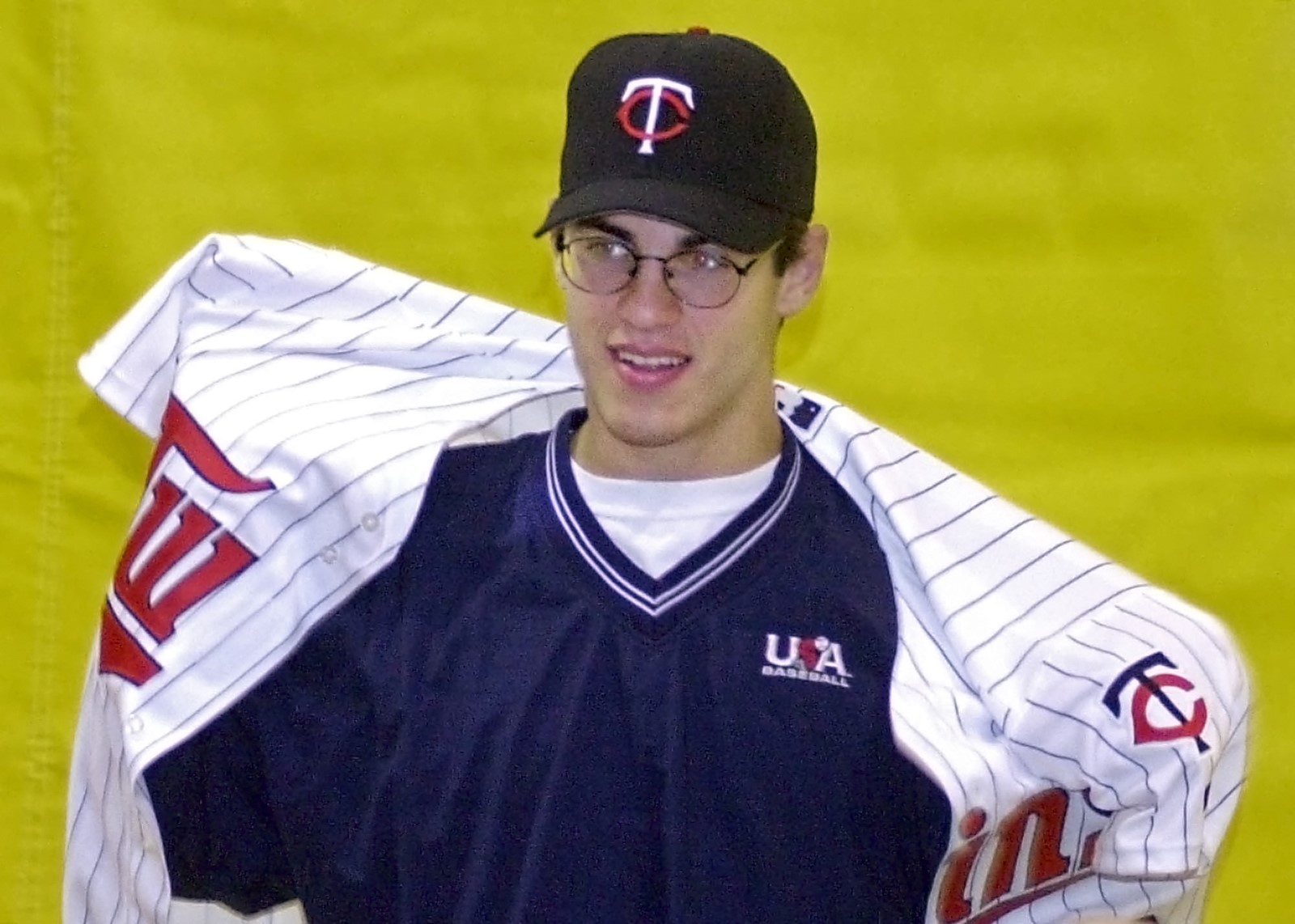
>> Joe Mauer’s Baseball Hall of Fame odyssey began at his family’s home on Lexington Parkway in St. Paul. Mauer had turned 18 in April of 2001 and would soon graduate from Cretin-Derham Hall after transcendent seasons in baseball, basketball and football.
The Minnesota Twins, after a 69-93 season in 2000, had earned the No. 1 overall pick in the major league’s amateur draft.
The Twins were primarily considering two players with the prized pick: Mauer, a catcher, and Mark Prior from the University of Southern California, rated by big league scouts as the top major league-ready pitcher in the history of college baseball.
And, the Twins were desperate for pitching.
Mauer, besides being the nation’s top high school catcher, was also the nation’s top-ranked high school quarterback and in April had committed to coach Bobby Bowden of Florida State, which the year before had produced Heisman Trophy-winning QB Chris Weinke, also from Cretin-Derham Hall.
The Twins had Joel Lepel, their Upper Midwest scouting supervisor who had a relationship with the Mauer family, visit the family’s blue-collar neighborhood home. Mauer’s adviser, Baltimore-based Ron Shapiro, who had also represented the Twins’ Kirby Puckett, had played the football leverage card when the Twins were doing due diligence on Mauer.
The Twins wanted to know whether football was a serious option for Mauer. Mauer’s father, Jake, a no-pretense guy, suggested Lepel take notice of the pictures around the house. All the pictures of Joe were baseball pictures. None were football.
The Twins had their answer, thanks to Jake. Now they would have to decide between Mauer and Prior.
>> On draft day, Twins general manager Terry Ryan gave Mike Radcliff, the club’s superb player personnel director, the option to choose the guy he thought would be the better player. When the draft began, without hesitation, Radcliff chose Mauer.
People who know insist it didn’t matter that Mauer was a hometown guy — if Radcliff thought Prior was the better prospect, he had permission to choose him. The Twins and Mauer settled on a $5.1 million signing bonus. Prior ended up going No. 2 in the draft to the Cubs, receiving a $4 million signing bonus. In five years, his pitching career was would be finished due to shoulder injuries.
>> In 2009, one season before the Twins would move from inside the Metrodome to outside at Target Field and one year before Mauer could have become a free agent, he hit .365 with 28 home runs and was named the American League’s MVP. Mauer was 26 and in his prime.
Joe couldn’t have timed it better.
The long steady careers of catchers Jason Varitek of the Red Sox and Jorge Posada of the Yankees were fading. Mauer’s inside-out swing would have knocked the green paint off Fenway Park’s famous 310-feet left-field wall with doubles, and the Yankees no doubt would have spent handsomely for Mauer.
But the Twins spent big, too, in spring of 2010 guaranteeing the local prodigy $184 million for eight years with a full no-trade clause. As lofty as was the Twins’ deal, Mauer’s market might have been some $50 million more had he opted for free agency.
Mauer, though, grew up dreaming of playing for the hometown team. The Twins had no problem agreeing to a $23 million per season deal. The only challenge was the length of the contract. Shapiro, though, held firm, and wouldn’t take fewer than eight years.
>> No doubt, before long the Twins will have a bronze statue of Mauer erected at Target Field.
>> As a batter, Mauer had a propensity to take a pitcher’s first strike. It didn’t take long for pitchers to realize they could slip a fastball down the middle to Mauer and he probably wouldn’t swing.
In the midst of his brilliant career with the Twins, I asked the .306 career hitter why he allowed pitchers that advantage. He responded quickly.“I’m doing OK, aren’t I?”
>> Another time, retired Twins Hall of Famer Harmon Killebrew, who took great pride in meticulously writing his name, was watching behind the batting cage at the Metrodome as Mauer sprayed line drives to all parts of the field.
“Very good, Joe,” Harmon said. “Now work on that signature.”
>> Mauer’s Hall of Fame election makes him just the second catcher in history, behind only Johnny Bench, in first-ballot percentage (76.1) of votes.
>> Mauer, sports memorabilia collectors will tell you, has always been a willing autograph signer, but not through the mail. Now that he’s a Hall of Famer, his autograph will be in higher demand. Fellow Hall of Famer, Mike Mussina, the former Yankees-Orioles pitcher, charges $20 for his signature through the mail. These days, Hall of Famers can spend an afternoon signing-session for a $25,000 stipend.
>> A Mauer-signed Twins game-used bat was for sale online last week for $2,499.07.
>> There have been only 60 first-ballot Baseball Hall of Famers. St. Paul has produced three of them (5%): Mauer, Paul Molitor and Dave Winfield.
>> Signed baseballs by 2018 Twins players were on sale for $30 on Saturday at TwinsFest.
>> Among Mauer artifacts on display at the Hall of Fame in Cooperstown is a 2014 bobblehead.
>> Mauer and Hannah Brandt will be named the Catholic Athletic Association’s outstanding athletes of the past 25 years on April 15 at the University of St. Thomas. The Mauer family will also be inducted into the CAA Hall of Fame. Also honored will be families of the CAA founders Fr. Otto Neudecker, Bob Doran and John Hajlo.
>> The Hall of Fame has partnered with Sports Travel and Tours for travel packages to Cooperstown (1-888-310-HALL).
>> Hall of Fame ex-Twin Jim Kaat will be a coach for the Memorial Day Weekend Hall of Fame East-West Classic tribute to Black Baseball at Doubleday Field in Cooperstown, N.Y.


 PREVIOUS ARTICLE
PREVIOUS ARTICLE
